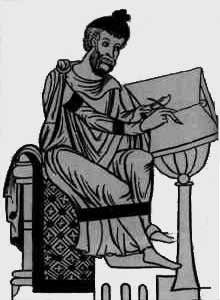St. Wulstan

Wulstan was the last Anglo-Saxon bishop. He came from a well connected family though they had lost their lands in the reign of King Canute. He was ordained a priest and was offered various lucrative posts in the Anglo-Saxon parishes that would have made his life very comfortable. Rejecting this he entered the monastery at Worcester and led a humble and ascetic life. In 1062 he was persuaded against his own preferences to be Bishop of Worcester - Harold, Godwinson the next King was one of those who supported his candidacy. As Bishop, Wulstan was noted for his dedication to the pastoral ministry. A regular visitor to the parishes in his diocese, he was often to be found baptising as well as confirming; this was something quite unusual for bishops in those days. A friend of the poor, he did a great deal to help those in need. He acted as confessor to Harold and was fearless in publicly calling him to act in a Christian way.
After the Battle of Hastings William the Conqueror began to give lands to those who had helped him and appoint his own men to positions of power in England. In the 1070s the Anglo-Saxon bishops were replaced. Norman churchman regarded the Church in England as having been mismanaged and in need of reform.
Wulstan was the only bishop of the old regime not to be replaced. No doubt this was partly because he supported the new King but also his reputation for holiness and efficient administration won him admiration.
One of his notable efforts was the successful abolition of the slave trade in the Bristol area (sadly it would emerge again as a trade hub in the terrible times of the trafficking of slaves from Africa centuries later). Slaves from Ireland were imported and sold on through the port and Wulstan went among the pens where they were held and preached against those involved in the business - an activity that put him in personal physical danger. In conjunction with Lanfrance, the Norman Archbishop of Canterbury he managed to have the commerce stopped.
After his death in 1095 he was quickly venerated by the people as a Saint and in 1203 by Pope Innocent III canonised him.
He is an example to us of someone who was not distracted by the turmoil of the times but remained faithful in pursuing what is right. In every age we can feel that our days and our situation make it hard to walk in the right path. Saint Wulstan reminds us that, with God's help, we can stay focussed.